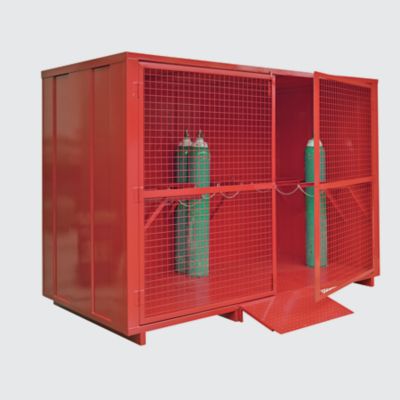We use compressed gases in nearly every aspect of our lives: to keep our food cold, to cook our food, to manufacture products, to heat our homes, and

Definitions
Common examples of compressed gases include:
- acetylene,
- oxygen,
- hydrogen,
- liquefied petroleum gas, and
- nitrous oxide.
Hazards
Compressed gases may be hazardous because they can be:
- under high pressure,
- flammable,
- an asphyxiant,
- oxidizing,
- corrosive,
- toxic or highly toxic, and/or
- cryogenic (extremely cold).
Handling Tips
Compressed gas cylinders are heavy and awkward to move, and therefore should only be handled by those who have been trained in proper handling techniques. Take the following precautions to prevent injuries when handling compressed gases:
Never:
- Drag or slide cylinders.
- Drop cylinders or allow them to strike each other violently.
- Subject cylinders to mechanical shock that may cause damage to their valves.
- Tamper with pressure-relief devices.
- Attempt to catch a falling cylinder.
Always:
- Move cylinders using a suitable hand truck or dolly.
- Secure cylinders when in storage, transit, or use.
- Use a cylinder cage or cradle to lift cylinder.
- Use the proper personal protective equipment (PPE) for cylinder handling, including wearing gloves, safety shoes, and other appropriate equipment.
Safety Tips
Take the following precautions to prevent injuries caused by asphyxiation, fire, explosion, high pressure, and improper handling of compressed gas cylinders:
Never:
- Allow storage temperature to exceed the temperature deemed appropriate by the supplier — since different gases have different temperature thresholds, check with supplier for appropriate storage conditions.
- Permit smoking or open flames in oxidizer or flammable gas storage areas.
- Expose cylinders to corrosive materials such as ice melting compounds.
Always:
- Store cylinders upright with valve outlet seals and valve protection caps in place.
- Secure cylinders when in storage, transit, or use.
- Keep full and empty cylinders separate.
- Store cylinders away from heavily travelled areas and emergency exits.
- Protect cylinders from wet or damp ground.
Find out more:
New Pig provide a comprehensive range of Material Storage & Handling solutions from our online shop. Or why not give us a call on 0800 919 900.






COMMENTS
These seem like great tips for keeping everyone safe while handling gas cylinders. You made a good point about how awkward the would be to lift by hand. Using the correct equipment to lift each one sounds much safer in addition to being easier to lift. I wonder if different kinds of compressed gasses are heavier than others.